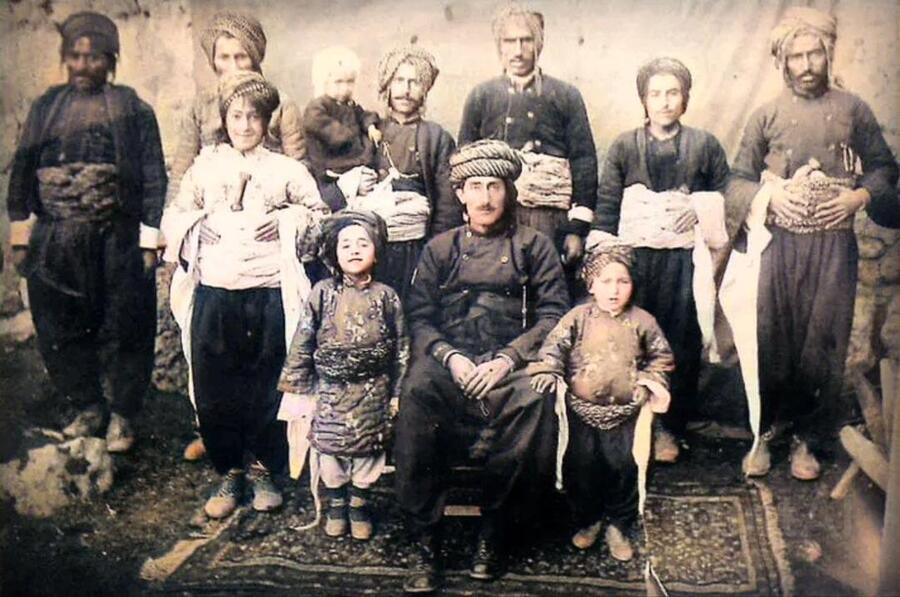As was mentioned in the previous part of this article, the Mukeryan region was the place where several significant tribes and clans settled; in this article, we will talk about one of these great clans, the way they came to this region, their scattering all over this area and their influence on a part of the events that happened in Kurdistan. The Fayzollabaigi is one of the great clans in Mukeryan, which is located between the "Ardalan" part of Kurdistan and "Urmia". Some of them live in parts of Bokan, Saqqez, Rabat, Sardasht, and Baneh cities. However, most of them have settled in an area between Bokan, Saqqez, and Diwandara cities.
Now, the area in Mukeryan that is identified as Fayzollabaigi needs to be probed carefully for some reasons.
First: Historically, this clan has close ties with the Bababans who established the Baban Emirate and Suleimani city. Each of these two clans is a descendant of a family tree that we will discuss later. Second: The area where this clan has settled is a long and vast region near the big river of Jaghatou which is always full of water making the surrounding plains the most fertile lands in the East part of Kurdistan possessing a lot of underground water sources that come from the "Chil Chama" origins in the mountains.
Third: The new pioneer of this clan, that is Fayzollabag's father, was not only a clan leader who would do daily tasks such as usual chores, agriculture, and social duties a leader but he was also a diplomat character who could contact Iran's kings and ministers to negotiate issues with them and make his clan's interests come true.
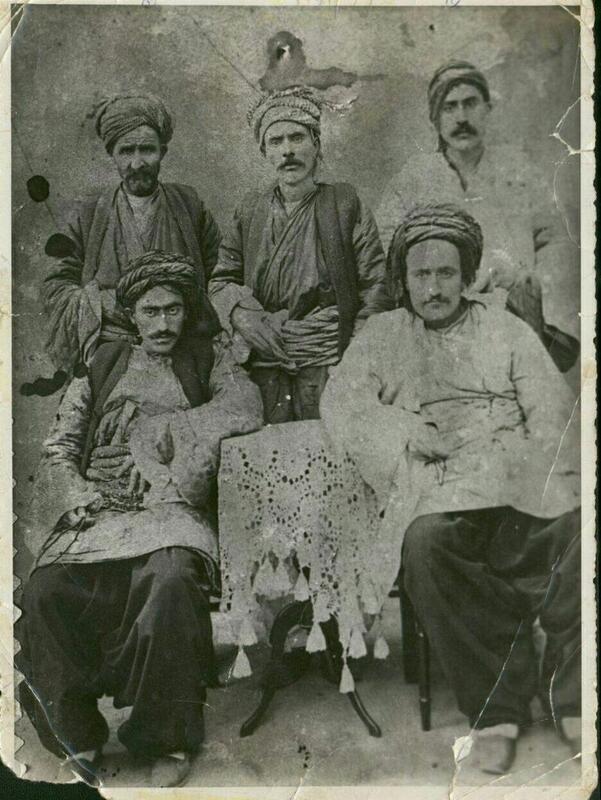
A photo of the Fayzollabaigi clan during Qajar
The figures from the right side are:
1. Agha Mo'men Bagi Yakshawa, son of Agha Sherbag, son of Agha Fayzollabag Mukri Babamiri
2. Agha Khalil Khan Dashaghlouja, son of Agha Sherbag, son of Fayzollabag Mukri Babamiri
3. Khalil Khan, father of three martyrs of the Kurdistan Republic, they were; Ahmad Khan Farouqi Qaylasoun known as (Salar), Mohammad Khan Danshwar, and Abdollah Khan Matin.
Fourth: During the new revolution in the East part of Kurdistan and the Kurdistan Republic, they participated in the revolution alongside the other people of Mukeryan helping out the Republic and its President, Qazi Mohammad. Many of their men were martyred for protecting Kurdistan's honor.
Fifth: In the new revolution of East Kurdistan and during the Kurdistan Republic, they participated in the revolution alongside the people of the Mukriyan region and helped the republic and the president of the Kurdistan Republic, Qazi Mohammad. In this way, they had great martyrs for the pride of the country.
The Fayzollabaigis who live in a vast land consisting of hundreds of villages have had many well-known families among them. Some of the most prominent families of this clan are Babamiri, Salimi, Shaji'i, Dadkha, Farouqi, Sherbagi, and Kaykhosrawi, …. Since all of these families belong to the Fayzollabaigis, they live in Bokan.
Two famous families "Bagzadah" and "Debokri" were living in the same area. According to the historical books, each of these families had at least one hundred villages under their control. The Debokris were settled in Burhan, a village between Bokan and Mahabad. Later, they scattered in the area and took control of most of the villages near Bokan.
The Debokris belonged to the Mukri clan based on what "Henry Rawlinson" claimed. "Basil Nikitin" also said that the Debokris were the first settlers of the Mukriyan region and they mixed with the Mukris later. Nikitin believed that their name must have been "De Mukri" before. Based on some ideas, this clan came from "Diyarbakir" during the "Nader Shah Afshar" reign in this area, and the name of Debokri is originally derived from Diyarbakir. We will discuss this more elaborately in the section of the Debokris.
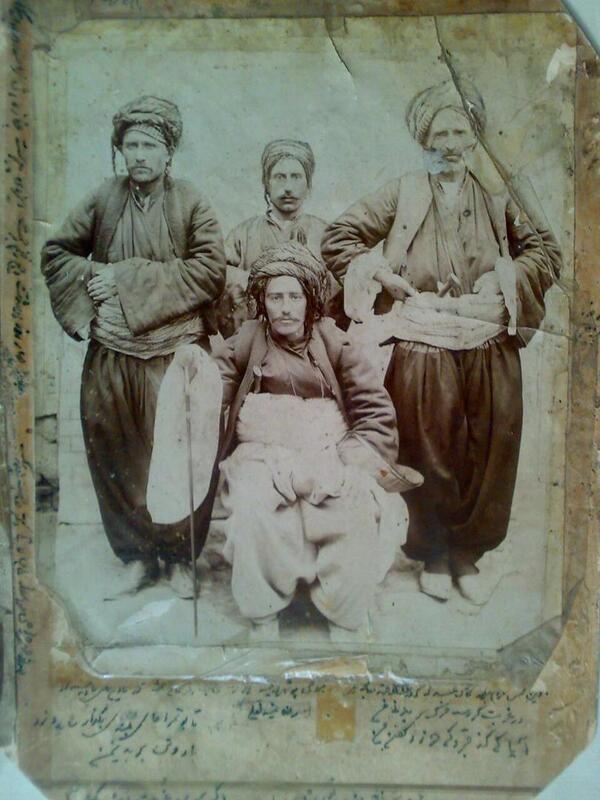
The Fayzollabaigis Clan during the Pahlavi Reign
The seated man is Abdollah Khan Yagi Kand, son of Bahram Khan, son of Haji Mohammad Saleh Bag, son of Agha Fayzollabaig Mukri Babamiri with three of his commanders.
Their migration to the west of Bokan City near "Jaghatou River" comes from another background that we will discuss later.
The Fayzollabaigi's origins come from "Faqe Ahmad Darashmana" who was one of the most prominent figures in the Southern part of Kurdistan. The Baban clan also descended from him. There are two opinions on the origin of the Fayzollabaigis, one of which is mentioned in the historical books as unproved information. That is, these books claim that this clan descend from much older origins and assume that Fayzollabag was son of Abdul Rahman Bag Mukri, son of Mustafa Bag II, son of Mustafa Bag I (known as Mustafa Bag Pe Bazi), son of Ahmad Khan, son of Mohammad Khan Baig, son of Sayfaddin, son of Pasha, son of Baba Omar, son of Faqe Ahmad Darashmana.
Some historians say that the origins of this dynasty have not been proven for sure. Like a myth, it has been narrated from one generation to the next, and there is no proven historical document about it. That is, there is not any written and recorded document to trace this dynasty back to the 17th century. The last person from this dynasty who can be talked about historically for sure is Abdul Rahman. The previous figures before Abdul Rahman till the first ancestor of this clan i.e., Ahmad Darashmana go back to several centuries ago that is "1610 to 1660" AD.
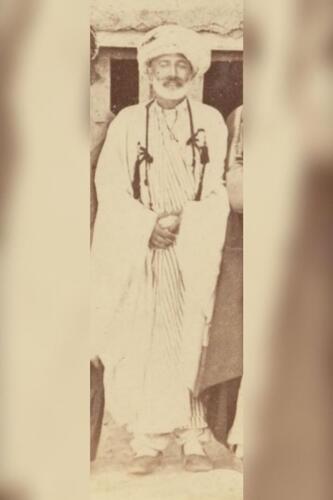
Fayzollabag Mukri Babamiri, the Fayzollabaigis ancestor
However, what is mentioned as a historical fact goes back to the last years of the Qajar reign. What can be accounted for as historical information is that Abdul Rahman Bag, father of Fayzollabag had three sons named Fayzolla, Karim, and Sultan.
Among these three, Fayzollabag was more skillful and wiser. He used to help all the villages he had to control to have basic utilities that would enhance the people's health such as public bathrooms, windmills, and mosques, …. For instance, in "In the History of Gawrk Clan" by "Mohsen Rashidi Gawrk" and "The Mukeriyan Culture and Literature History" by "Ibrahim Afkhami", Abdul Rahman Bag father of Fayzollabag has been mentioned.
These sources mention that this clan and its leader Abdul Rahman were previously settled in Mahabad and its surrounding areas. However, when they faced deep dilemmas with the Mangur clan, they were forced to migrate their people to Bokan. In one of the battles between these two clans, Abbas Agha, the leader of the Debokri clan was killed. After this incident and in order to prevent more problems and issues among the clans settling around Mahabad, Abdul Rahman Bag used a diplomatic method and he tried to prevent more violence by contacting the political leaders of Iran so that no more battles would occur among these great clans. He traveled to "Tehran", the capital city of Iran, and met "Haji Mirza Aghasi", Iran's Prime Minister at that time, to discuss the risks of clan battles with him, such as the risk of many casualties and destruction of most of the people's income sources. Later, he gained the opportunity to meet Iran's king and later he managed to prevent more clan battles by using the troops from the capital. After all these, the Fayzollabigis clan moved to Bokan more and more. This area was then under the control of some foreign forces. The lands and villages of Bokan were under the control of the Afshar Turks during Qajar reign. A part of this area was under the control of a clan called Warmzyar.
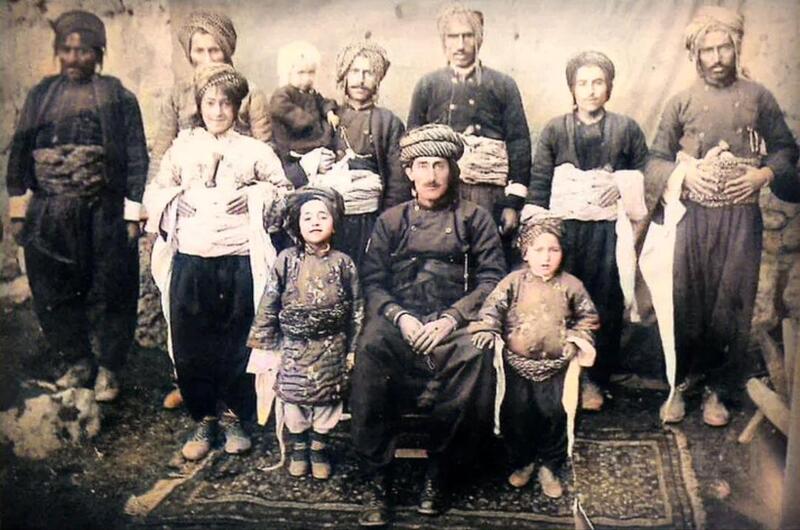
An example of a historical picture of the Mukeriyan region with Kurdish traditional clothes from one hundred years ago of the Fayzollabaigis clan. The seated ones are: Haji Shahab (Faraydoun Bag Tirkasha) Amiri son of Mirbag son of Haji Mohammad Hassan Bag son of Agha Fayzollabag Mukri with his sons and his men.

